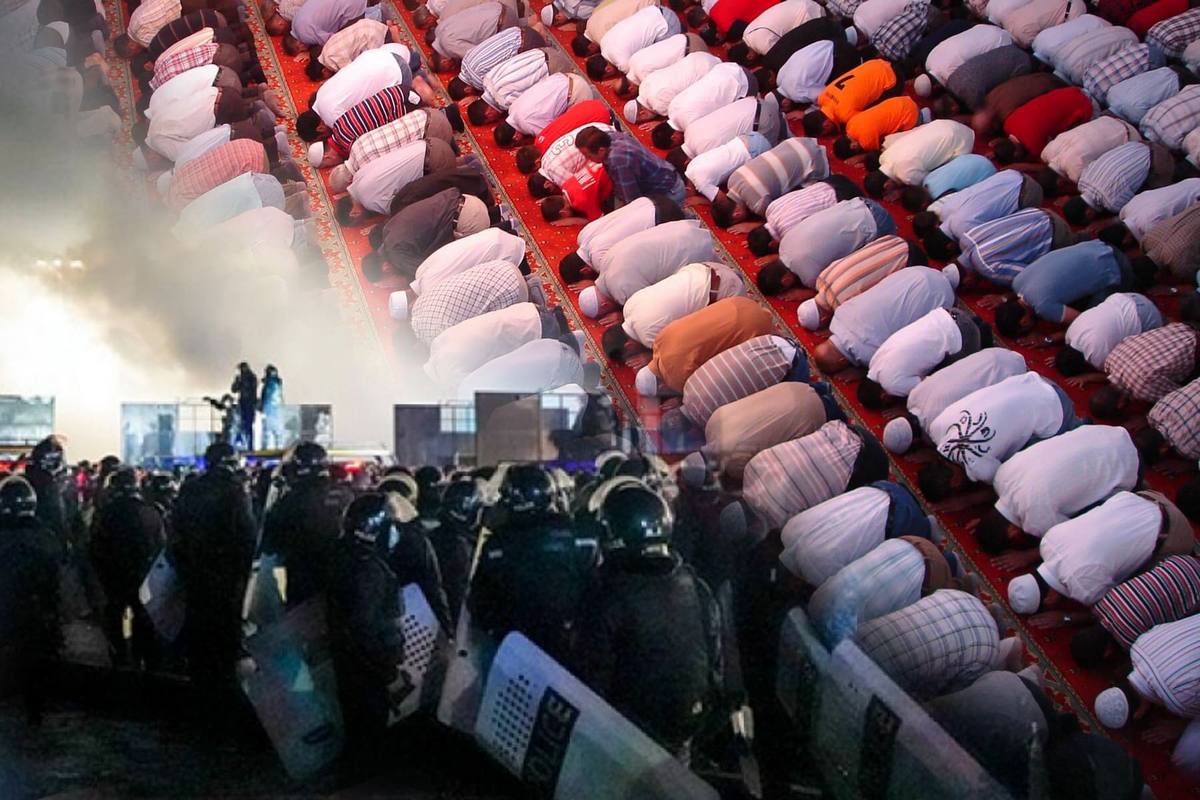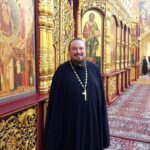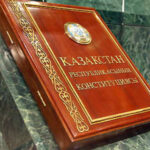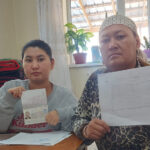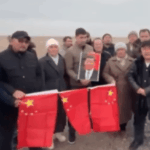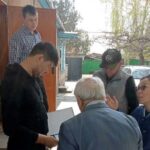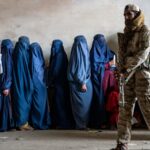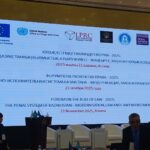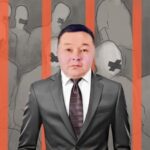At least 3 of the 8 current known prisoners of conscience jailed for exercising freedom of religion or belief have had applications for conditional early release rejected on grounds their families regard as arbitrary. In June, a Kyzylorda court rejected Dadash Mazhenov’s request, apparently citing his unpaid fees for the “expert analyses” used to convict him. “These fees were just an excuse,” his family told Forum 18. The Head of Labour Camp No. 68, Kaiyrbek Ilyasov, refused to discuss why Mazhenov was refused conditional early release.
Of the 8 individuals (all of them Sunni Muslim men) known to be currently serving jail terms to punish them for exercising freedom of religion or belief, at least 3 have been repeatedly refused transfer to conditional early release or at least to a labour camp nearer home. Their families say such transfers were refused on grounds their families regard as arbitrary. One – Dadash Mazhenov – was most recently denied a transfer to a labour camp nearer home apparently to punish him for wearing shorts and praying while standing up after lights out.
“Dadash was given a reprimand for praying standing up after lights out,” Mazhenov’s family complained to Forum 18. “You get no reprimand for standing up and smoking after lights out but for praying you do” (see below).
In June, a Kyzylorda court rejected Mazhenov’s request for conditional early release, apparently citing his unpaid fees for the “expert analyses” used to convict him (see below).
“But these fees were just an excuse,” Mazhenov’s family told Forum 18. “No one is prepared to release Dadash as there were so many violations of the law in his case. He has served most of his sentence, but still they keep hold of him and will not release him or transfer him closer to his place of residence” (see below).
The Head of Labour Camp No. 68 in Kyzylorda, Kaiyrbek Ilyasov, refused to discuss why Mazhenov was refused conditional early release or why he has been placed in the camp’s special unit. Nor did he discuss why no one has been brought to trial on charges of torture after camp guards beat Mazhenov with truncheons in January 2022, breaking his jaw (see below).
Prisoner of conscience Abdukhalil Abduzhabbarov “hasn’t appealed again for conditional early release as there’s no point”, his wife Dinara told Forum 18. “Each time they refuse him.” The National Security Committee (KNB) secret police had earlier offered him early release if he made a video address “admitting what he was accused of. He refused, as he considers himself not guilty” (see below).
Similarly, prisoner of conscience Galymzhan Abilkairov has been refused transfer to conditional early release. “He applied, we applied, but they told us he doesn’t qualify because of the Criminal Code Article he was sentenced under,” his mother told Forum 18. Abilkairov was jailed for posting on his VKontakte account talks on Islam on charges of “Propaganda of terrorism or public calls to commit terrorism” (see below).
When those criminally convicted and jailed to punish their exercise of freedom of religion or belief seek transfer from prison to serve the rest of their term under restricted freedom, where the convicted person lives at home under restrictions, the decision whether or not to grant such early conditional release appears to lie with the National Security Committee (KNB) secret police.
“When the Criminal Code Articles are related to so-called ‘extremist’ and ‘terrorist’ crimes, the National Security Committee people ‘supervise’ these prisoners in prisons,” Yevgeny Zhovtis of the Kazakhstan International Bureau for Human Rights and the Rule of Law told Forum 18 on 19 September. “It is they who influence (unofficially) the early release or replacement of imprisonment with restricted freedom. Prison administrations and judges usually follow the unofficial recommendations of these KNB people.”
Three of the current known individuals jailed for exercising freedom of religion or belief – Beket Mynbasov, Samat Adilov and Ernar Samatov – participated in an online Muslim discussion group. The other six initially jailed with them are now at home serving restricted freedom sentences. In September 2021, the United Nations Working Group on Arbitrary Detention called for them to be “immediately” freed and compensated for their imprisonment. None has been freed from their sentence or compensated.
(The 8 current known prisoners of conscience jailed for exercising freedom of religion or belief are listed at the foot of the article.)
Mazhenov: Repeated challenges to conviction fail
Muslim prisoner of conscience Dadash Mazhenov, whose 33rd birthday is on 28 September, is serving a term of 7 years and 8 months in a general regime labour camp handed down in a second trial in October 2020 for posting online four talks by Muslim teacher Kuanysh Bashpayev years before the talks were banned as “extremist”. An “expert analysis” was used to convict him, as is often the case with prosecutions for exercising freedom of religion and belief.
The KNB secret police arrested Mazhenov in April 2018. He endured a first trial that ended with the nearly eight year prison term, torture for praying while in prison, and a second trial on the same charges after the first verdict was overturned. Even after the first verdict was overturned by the Supreme Court in January 2020, he was not acquitted and continued to be held in detention.
Mazhenov’s prison term is due to end on 15 March 2025, as one day in pre-trial detention now counts as one and a half days of a prison sentence.
Mazhenov’s family have repeatedly tried to overturn his conviction and, if that fails, to have him transferred from his distant labour camp in the southern city of Kyzylorda to a camp nearer to his home in the northern city of Shchuchinsk. All such attempts have failed.
In early 2023, the family appealed to the government-appointed Human Rights Commissioner Artur Lastayev. Amir Umarov, Acting Head of the government-controlled National Human Rights Centre, insisted in the response to Mazhenov’s family (seen by Forum 18) that the Human Rights Commissioner cannot seek to influence judicial decisions.
Umarov added that the Human Rights Commissioner cannot challenge Mazhenov’s conviction through the Constitutional Court as the Commissioner can make such submissions only to assess the conformity with the Constitution of normative legal acts (laws). He told the family that “pointing to a violation of the law, you are expressing disagreement with concrete court decisions. We note that court decisions are not normative legal acts.”
Umarov also told the family that the decision as to which labour camp to send a prisoner to lies with the Interior Ministry’s Criminal Sentences Implementation Department.
Mazhenov’s family then sent the same request to the Presidential Administration. However, it sent the request on to the General Prosecutor’s Office, which in turn sent it on to Akmola Region’s Prosecutor’s Office.
On 28 March, Vladimir Malakhov, First Deputy Prosecutor of Akmola Region, responded to the appeal. He rejected any investigation of the family’s complaint against the “expert analysis” which formed the basis of Mazhenov’s conviction.
“No violations of the norms of criminal procedural law were established in the court’s examination of the case,” Malakhov declared in the letter seen by Forum 18. He repeated the response of 29 April 2022 that no response from prosecutors was therefore needed.
Malakhov said the Finance Ministry’s Financial Monitoring Agency was responsible for placing Mazhenov on the List of individuals “connected with the financing of terrorism or extremism”, which blocked his bank accounts. He added that it was the Interior Ministry’s Criminal Sentences Implementation Department which decided where prisoners are sent to serve their sentences.
Mazhenov: “No officials have been brought to criminal trial for the beating”
Dadash Mazhenov has been held in labour camp in the southern city of Kyzylorda since October 2018. The camp administration tortured him by keeping him in solitary confinement in an isolation cell for “fabricated violations” from July 2019 for about the next year.
In an August 2011 report to the UN General Assembly on solitary confinement (A/66/268), then-UN Special Rapporteur on Torture and Other Cruel, Inhuman or Degrading Treatment or Punishment Juan Mendez, after examining cases in Kazakhstan and elsewhere, stated that even “short-term solitary confinement can amount to torture or cruel, inhuman or degrading treatment or punishment”. On 18 October 2011 he cited Kazakhstan again and stated: “Segregation, isolation, separation .. whatever the name, solitary confinement should be banned by States as a punishment or extortion technique”.
Rule 43 of the UN Standard Minimum Rules for the Treatment of Prisoners (known as the Mandela Rules – A/C.3/70/L.3) notes: “In no circumstances may restrictions or disciplinary sanctions amount to torture or other cruel, inhuman or degrading treatment or punishment.” Among the practices that “in particular, shall be prohibited” are indefinite solitary confinement and prolonged solitary confinement.
Then-Special Rapporteur on Torture and Other Cruel, Inhuman or Degrading Treatment or Punishment Mendez found in 2011 that “solitary confinement exceeding 15 days is prolonged.”
In January 2022, camp officials tortured Mazhenov again by beating him with truncheons, breaking his jaw, his family said. He was treated afterwards in the camp clinic. The officials described him as “Cargo 200” (Gruz-200 in Russian), a term used in the military for the transport of coffins.
Under the UN Convention against Torture and Other Cruel, Inhuman or Degrading Treatment or Punishment, Kazakhstan is obliged both to arrest any person suspected on good grounds of having committed torture, and to try them under criminal law which makes “these offences punishable by appropriate penalties which take into account their grave nature”.
Kairat Olzhabayev, the then acting head of Kyzylorda labour camp ZK-169/1 (now renumbered Labour Camp No. 68), refused to answer Forum 18’s questions in April 2022 why Mazhenov was being tortured by putting him in solitary confinement, and why he had been tortured by being beaten in early 2022. Olzhabayev claimed that “it didn’t happen” and put the phone down. Maya Simbayeva, head of the Special Department at the camp, similarly refused to answer any questions about Mazhenov and put the phone down.
“No officials have been brought to criminal trial for the beating,” Mazhenov’s family told Forum 18 on 26 September 2023.
The Head of Labour Camp No. 68 in Kyzylorda, Kaiyrbek Ilyasov, refused to discuss with Forum 18 on 25 September why no one has been brought to trial on charges of torture.
Mazhenov: “No reprimand for .. smoking after lights out but for praying you do”
In summer 2023, the administration of Labour Camp No. 68 in Kyzylorda reported on Mazhenov’s conduct to the Criminal Sentences Implementation Department. It alleged that he had broken prison rules by wearing shorts and praying while standing after lights out, Mazhenov’s family told Forum 18. The Criminal Sentences Implementation Department then refused to transfer him to serve the rest of his term closer to his home in northern Kazakhstan.
“Dadash was given a reprimand for praying standing up after lights out,” his family complained. “You get no reprimand for standing up and smoking after lights out but for praying you do.”
Mazhenov had applied for early conditional release in mid-2023 as he had about 21 months of the prison sentence left to serve. However, at a hearing on 12 June, a Kyzylorda court (apparently the City Court) rejected the application. One reason for the rejection was that Mazhenov has not paid the fees set out in the verdict for the “expert analyses” used to convict him, his family said. The family have not seen the court decision.
The Justice Ministry List of Debtors records Mazhenov as owing 134,599 Tenge. These were the fees imposed by the courts for the April 2018 and May 2020 “expert” analyses on which he was convicted.
“But these fees were just an excuse,” Mazhenov’s family told Forum 18. “No one is prepared to release Dadash as there were so many violations of the law in his case. He has served most of his sentence, but still they keep hold of him and will not release him or transfer him closer to his place of residence.”
Labour Camp No. 68 in Kyzylorda is holding Mazhenov in a cell with one or two other prisoners. The cell is one of a row of cells in the basement of a special unit which is supposed to be for prisoners who are under investigation.
Labour Camp No. 68’s Head, Kaiyrbek Ilyasov, refused to discuss why Mazhenov was placed in the special unit, when, and why he was refused conditional early release.
Ilyasov insisted that it was not his decision to place Mazhenov in the special unit. “We had a special detachment that came to the camp and they decided,” he told Forum 18 on 25 September. He said Mazhenov was not alone in his cell. Asked why he has been refused conditional release or transfer to a labour camp nearer his home, Ilyasov responded: “These are not our decisions. We just feed and hold [prisoners].”
Mazhenov’s address in labour camp:
Kyzylordinskaya Oblast
120001 g. Kyzylorda
ul. Tole bi 136
Uchr. 68 DUIS po Kyzylordinskoi Oblasti
Abduzhabbarov “hasn’t appealed again for conditional early release as there’s no point”
The 48-year-old Muslim prisoner of conscience Abdukhalil Abduzhabbarov is due to complete his 8-year prison term in October 2024. Oral City Court jailed him in August 2017 on charges of inciting religious discord “with serious consequences” in recordings of his sermons and talks.
Abduzhabbarov was tortured from October 2017 by being held in solitary confinement. In July 2021, his 82-year-old father died and the regime barred him from attending the funeral.
Officials have repeatedly refused Abduzhabbarov’s requests to be granted conditional early release or a transfer to a lesser form of punishment. The KNB secret police “proposed that he make a video address admitting what he was accused of. He refused, as he considers himself not guilty,” the family told Forum 18 in May 2022.
“He hasn’t appealed again for conditional early release as there’s no point,” Abduzhabbarov’s wife Dinara told Forum 18 on 19 September 2023. “Each time they refuse him.” She notes though that he has been put on the first level for good conduct.
Neither the camp Head, Kaiyrbek Ilyasov, nor the Special Department of Labour Camp No. 68 in Kyzylorda would discuss Abduzhabbarov’s situation with Forum 18 on 25 September.
Abduzhabbarov’s address in labour camp:
Kyzylordinskaya Oblast
120001 g. Kyzylorda
ul. Tole bi 136
Uchr. 68 DUIS po Kyzylordinskoi Oblasti
Abilkairov: Conditional early release refused
The 35-year-old Muslim prisoner of conscience Galymzhan Abilkairov was jailed in 2018 for 7 years and 7 months for posting on his VKontakte account talks on Islam by Sunni Muslim Kuanysh Bashpayev.
Burabai District Court sentenced Abilkairov under Part 2 of Criminal Code Article 256 (“Propaganda of terrorism or public calls to commit terrorism” – which includes the production, storage for distribution or distribution of [unspecified in the Article] specified materials – committed by an individual using a state or non-state official position, or with the use of the mass media or other communication networks, or with foreign support, or in a group”).
Abilkairov has been refused transfer to conditional early release. “He applied, we applied, but they told us he doesn’t qualify because of the Criminal Code Article he was sentenced under,” his mother told Forum 18 on 14 September 2023.
After his wife died in 2019, the camp administration did not allow Abilkairov to attend the funeral.
Abilkairov’s address in labour camp:
Jambylskaya Oblast
080000 g. Taraz
ul. Nietkaliyeva 104A
Spetsotryad
Uchr. 25 DUIS po Jambylskoi Oblasti
Zernichenko: “We want to lodge an appeal for conditional early release”
The 28-year-old Muslim prisoner of conscience Anatoli Zernichenko was jailed in June 2022 for posting on his social media accounts Muslim texts which prosecutors without any evidence claimed promoted terrorism. He has already served nearly two years in prison, as his 7-year sentence is counted from the date of his arrest in October 2021.
“We want to lodge an appeal for conditional early release,” his wife Anna Tukova told Forum 18 on 13 September.
Zernichenko is serving his sentence in a labour camp in the southern city of Shymkent. He can pray without problem there, but is not allowed to have religious books with him. “He can read religious books only in the library,” Tukova said.
Such denials of religious literature are in violation of the UN Standard Minimum Rules for the Treatment of Prisoners (known as the Mandela Rules, A/C.3/70/L.3). Rule 66 states: “So far as practicable, every prisoner shall be allowed to satisfy the needs of his or her religious life by attending the services provided in the prison and having in his or her possession the books of religious observance and instruction of his or her denomination.”
Zernichenko’s address in labour camp:
160023 g. Shymkent
Abaisky raion
Trassa Tamerlan 36, Zdanie 28/1
Uchr. 54 po g. Shyment i Tukestanskoi Oblasti
Zernichenko: Constitutional Court challenge
Muslim prisoner of conscience Anatoli Zernichenko is also trying to challenge the basis of his conviction. In March 2023, his lawyer Ablai Beiseyev submitted a suit on his behalf to the Constitutional Court in the capital Astana.
The suit (seen by Forum 18) noted that, in Zernichenko’s conviction, “the view of the court fully and completely depends on the conclusions of the expert analyses” that found that the Muslim works he had distributed “contained elements of terrorism and extremism” as well as “propaganda of terrorism and extremism”.
Zernichenko’s suit pointed out that two of the “experts” who contributed to the analyses – Aigerim Seifullina and Marina Onuchko – were not recognised as qualified experts to give such judicial analyses.
On 17 April the Constitutional Court sent the suit back, citing “mistakes”. After it was resubmitted, the Court again sent it back on 11 May, again citing “mistakes”, a Constitutional Court official told Forum 18 on 22 September.
“No hearings in the case took place,” Zernichenko’s wife Anna Tukova told Forum 18. “We are planning to lodge the suit again shortly.”
8 known prisoners of conscience jailed for exercising freedom of religion or belief
The 8 current known prisoners of conscience jailed for exercising freedom of religion or belief are listed in approximate reverse order of expected date of release.
Convictions have been under Criminal Code articles:
– 174 (“Incitement of social, national, clan, racial, or religious discord, insult to the national honour and dignity or religious feelings of citizens, as well as propaganda of exclusivity, superiority or inferiority of citizens on grounds of their religion, class, national, generic or racial identity, committed publicly or with the use of mass media or information and communication networks, as well as by production or distribution of literature or other information media, promoting social, national, clan, racial, or religious discord”);
– and 256 (“Propaganda of terrorism or public calls to commit terrorism” – which includes the production, storage for distribution or distribution of [unspecified in the Article] specified materials – committed by an individual using a state or non-state official position, or with the use of the mass media or other communication networks, or with foreign support, or in a group”).
1) Anatoli Pavlovich Zernichenko; Sunni Muslim; born 21 October 1994.
Arrested 15 October 2021; sentenced 20 June 2022 Arys District Court.
Criminal Code Article 256, Part 2.
Appeal rejected 10 August 2022 Turkestan Regional Court.
Punishment:
– 7 years’ imprisonment in a general regime labour camp;
– plus “compensation” to alleged “victims” of 55,560 Tenge;
– plus court fee of 870,900 Tenge;
– plus bank accounts blocked.
2) Dadash Temirgaliyevich Mazhenov; Sunni Muslim; born 28 September 1990.
Arrested 23 April 2018; sentenced 16 November 2018 Burabai District Court.
Criminal Code Article 256, Part 2.
Appeal rejected 30 January 2019 Akmola Regional Court. Supreme Court annulled earlier decisions (but did not acquit him) 21 January 2020 and sent case for new trial.
Sentenced 13 October 2020 Akmola Regional Court.
Criminal Code Article 256, Part 2.
Punishment:
– 7 years and 8 months’ imprisonment in a general regime labour camp;
– plus court fee of 134,599 Tenge;
– plus bank accounts blocked.
3) Ernar Samatovich Samatov; Sunni Muslim; born 19 March 1980.
Arrested 27 October 2018; sentenced 5 August 2019 Almaty’s Almaly District Court.
Criminal Code Article 256, Part 2 and Article 174, Part 2.
Appeal rejected 20 November 2019 Almaty City Court.
Punishment:
– 7 and a half years’ imprisonment;
– plus “compensation” to alleged “victims” of 48,100 Tenge;
– plus court fees;
– plus bank accounts blocked.
4) Beket Tastanbekovich Mynbasov; Sunni Muslim; born 10 January 1983.
Arrested 27 October 2018; sentenced 5 August 2019 Almaty’s Almaly District Court.
Criminal Code Article 256, Part 2 and Article 174, Part 2.
Appeal rejected 20 November 2019 Almaty City Court.
Punishment:
– 7 and a half years’ imprisonment;
– plus “compensation” to alleged “victims” of 48,100 Tenge;
– plus court fees;
– plus bank accounts blocked.
5) Dilmurat Sultanmuratovich Makhamatov; Sunni Muslim; born 19 February 1978.
Arrested 19 December 2018; sentenced 2 May 2019 Shymkent’s Al-Farabi District Court.
Criminal Code Article 174, Part 2 and Article 256, Part 2.
Appeal rejected 26 June 2019 Shymkent City Court.
Punishment:
– 8 years’ imprisonment in a general regime labour camp;
– plus bank accounts blocked;
– plus banned from leaving the country on 18 March 2020.
6) Galymzhan Ramazanovich Abilkairov; Sunni Muslim; born 29 January 1988.
Arrested 23 April 2018; sentenced 19 October 2018 Burabai District Court.
Criminal Code Article 256, Part 2.
Appeal rejected 26 December 2018 Akmola Regional Court.
Punishment:
– 7 years and 7 months’ imprisonment;
– plus bank accounts blocked.
7) Samat Asylkhanovich Adilov; Sunni Muslim; born 28 August 1986.
Arrested 27 October 2018; sentenced 5 August 2019 Almaty’s Almaly District Court.
Criminal Code Article 174, Part 2.
Appeal rejected 20 November 2019 Almaty City Court.
Punishment:
– 5 and a half years’ imprisonment;
– plus “compensation” to alleged “victims” of 48,100 Tenge;
– plus court fees;
– plus bank accounts blocked.
8) Abdukhalil Abdukhamidovich Abduzhabbarov; Sunni Muslim; born 6 April 1975.
Arrested 18 February 2017; sentenced 16 August 2017 Oral City Court.
Old Criminal Code Article 164, Part 3 (replaced from January 2015 by Criminal Code Article 174, Part 3).
Punishment:
– 8 years’ imprisonment;
– plus bank accounts blocked.
Source:
Forum 18

